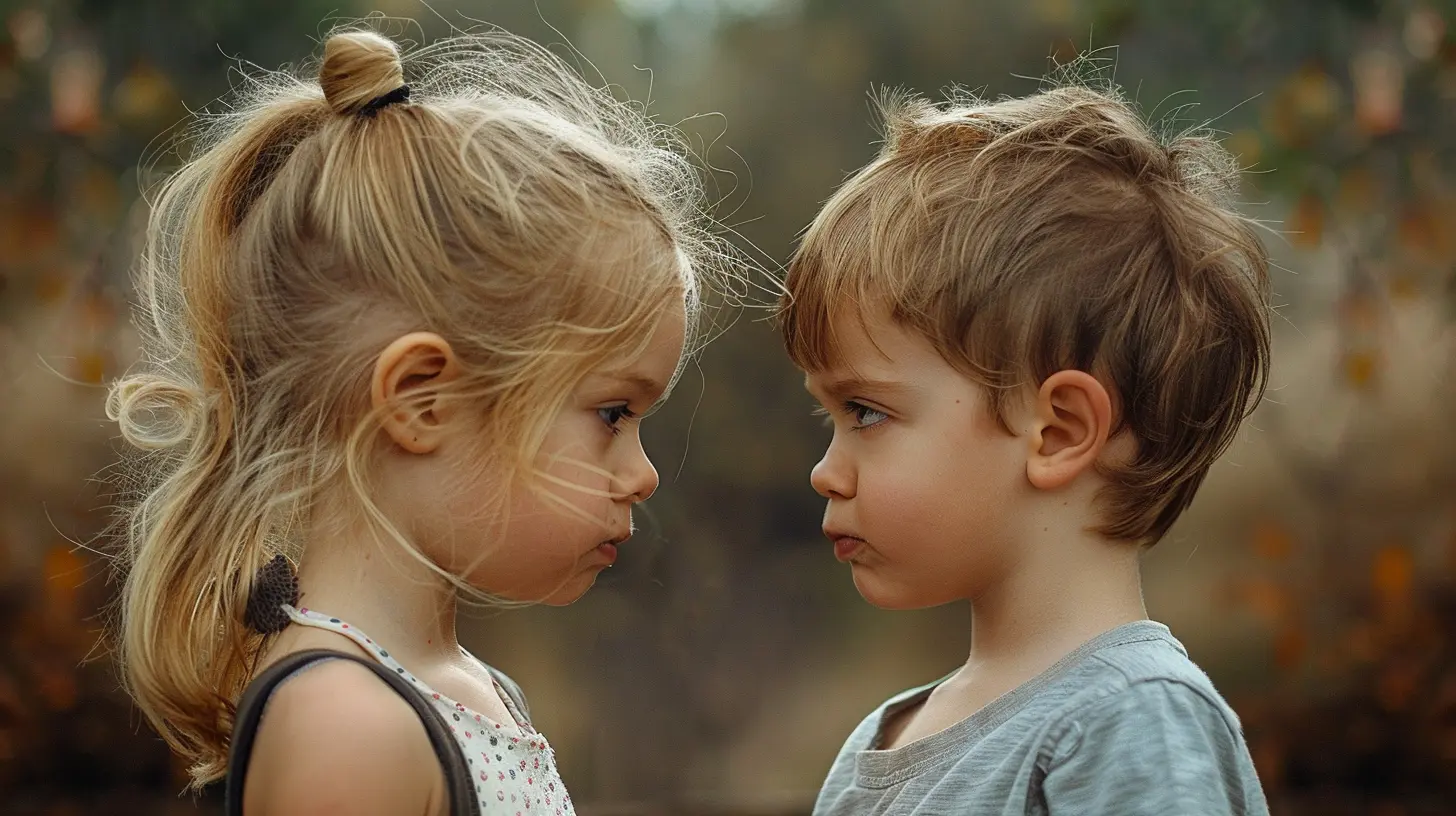The Link Between Sibling Rivalry and Parental Involvement
23 June 2025
Let’s be honest… if you’ve got more than one kid, you KNOW about sibling rivalry. The eye rolls, the tattling, the shouting matches over who looked at who the wrong way—siblings have a special way of turning your peaceful living room into a battleground over the last juice box. And as a parent? Sometimes it feels like you're a referee in a WWE match, except everyone's under four feet tall and powered by fruit snacks.
But here’s the kicker: sibling rivalry isn't just about the extra cookie or who got the front seat. A huge part of it—like, Titanic iceberg huge—comes down to one sneaky little factor: how involved you are as a parent.
Yep. Turns out your role in their day-to-day world plays a massive part in how your kids interact with each other. So, let’s buckle up and dive into the chaotic, often hilarious world of siblings, and how your parenting style might be either fueling the fire or helping build the sibling dream team.
What Even Is Sibling Rivalry?
Ah, sibling rivalry: that magical blend of love, jealousy, competition, and occasional hair pulling. It’s been around since the beginning of time (Cain and Abel, anyone?), and while it’s super common, that doesn’t mean it’s not frustrating.Sibling rivalry usually starts when the second kid enters the scene. The firstborn, who up until that point has been enjoying the glorious status of “the chosen one,” suddenly gets demoted. And boy oh boy, do they notice. Then comes years of trying to get your attention back—whether that’s through shining achievements… or loud, dramatic squabbles.
But here's the juicy part—these squabbles aren't always about the actual conflict. They're often about deeper stuff: belonging, significance, and yes, parental attention.
The Parental Spotlight: Why Kids Want It and How They Fight for It
Imagine you're in a play, and the spotlight is directly on you. Feels good, right? Now imagine someone else stepping in and hogging that light. Enter: new sibling.Kids crave attention. It’s how they measure their worth, feel secure, and know they matter. When parents don’t spread those golden rays of love equally (even when they think they are), some serious competition can flare up.
And let's be real—dividing your attention equally between two or more mini-humans is like trying to cut a pizza into perfectly fair slices while riding a unicycle. It’s HARD. But the way we manage it… well, it matters.
Helicopter, Uninvolved, or Just Right? Your Parenting Style Makes a Difference
Parental involvement isn’t just about being there. It’s about being present. You can physically be in the room scrolling Facebook while the kids play, but if you’re not actively tuning in, they notice.Let’s break down how different parenting styles can affect sibling rivalry:
1. The Helicopter Parent
You hover. You swoop in at the first sign of trouble. You’re basically a watchdog with snacks. While you might think this solves all problems fast, kids who never get to work through their own conflicts may actually end up resenting not only you—but each other. They learn to compete for your rescue rather than figure things out.Cue the dramatic cries of: “MOMMMM look what she DID!”
2. The Hands-Off Parent
You let them “figure it out.” You’re sipping your coffee in the next room like, “Unless there's blood, I’m staying out of it.” Ironically, being too uninvolved can also crank up sibling rivalry—big time. Kids end up battling it out for attention, with no guidance on what’s fair or kind.3. The Goldilocks Parent (a.k.a. "Involved but Chill")
This is where magic happens. You're involved, but you let them try. You step in when things go sideways but also teach conflict resolution. You validate feelings, encourage empathy, and (importantly) give each kid individual attention. This helps them feel seen—and less like they need to fight their sibling for that spotlight.
Quality Over Quantity: It's Not About Time, It’s About Connection
Parents, good news: you don’t need to spend 24/7 with your kids to make them feel valued (because let’s face it, nobody has time for that—even Super Parents need to pee in peace).What really matters is how you spend the time you do have. Here’s what makes the difference:
- One-on-One Moments – Take each kid out solo sometimes. Even if it's just a trip to the grocery store, that undivided attention is priceless.
- Listening Without Fixing – Sometimes, just validating their feelings (“Wow, that must’ve been frustrating”) is more powerful than swooping in with a solution.
- Fair, Not Equal – This one’s tricky. Giving all kids the same thing doesn't always feel fair to them. One kid might need more emotional support, another more academic help. Tailor your involvement to their unique needs.
- Conflict Coaching – Teach them to express themselves, listen to one another, and compromise. It’s Parenting 101 meets United Nations mediation. Bring snacks.
Sibling Rivalry Is a Symptom, Not a Disease
Here’s an uncomfortable truth: intense sibling rivalry is often a sign that one (or both) kids don’t feel like they’re getting their emotional needs met.That doesn’t mean you're a bad parent. It just means your radar needs a little adjusting.
Think of it like this: if your kids are garden plants (stick with me), sibling rivalry is the weeds. Your job isn’t to just pull out the weeds (the fights). Your job is to water and care for each plant so they’re strong enough to handle whatever comes their way. (Also, explain to them that they're not allowed to uproot each other. That helps.)
Real Talk: You’re Gonna Mess This Up Sometimes (And That’s Okay)
Here’s where I get brutally honest: there is no perfect way to parent.Some days you’ll step in too much. Some days you'll pray for bedtime at 3 PM.
Maybe you’ll accidentally praise one kid too much at dinner, and the other will stare at you like you just ran over their favorite stuffed animal. You’re human. They’re human. Life isn’t Pinterest-level perfect, and that’s perfectly fine.
What matters most is that you’re trying. You’re showing up, you care, and you’re doing your best to raise kind, emotionally intelligent little humans who don’t try to body-slam their siblings every chance they get.
How to Reduce Sibling Rivalry (Without Losing Your Sanity)
Here are some down-to-earth, real-world, not-written-by-a-child-development-robot tips that help reduce sibling rivalry:✅ Acknowledge Each Kid’s Strengths
Celebrate their unique awesomeness. One may love puzzles, the other dinosaurs. Let 'em shine in their own way without comparing them.✅ Don’t Play Favorites (Even Accidentally)
Yes, one does their homework without being asked. The other acts like you’ve declared war by asking them to pick up a sock. Praise behavior, not identity. Say, “That was so kind of you” not “You’re the good one.”✅ Let Them Fight… A Little
Conflict teaches kids empathy, negotiation, and emotional regulation. Monitor the situation, but let them try to work through it.✅ Teach ‘I’ Statements
Instead of “You’re so annoying!” Teach: “I feel upset when you take my toy without asking.” It’s not a magic fix, but it’s a step.✅ Make Family Time a Team Sport
Board games, cooking together, or tag in the backyard. Positive shared experiences build bonds. Or at least peace treaties.When Sibling Rivalry Turns into Sibling Wars
Not all rivalry is harmless. Here are signs you might need extra help:- One sibling is always dominant or aggressive
- Physical aggression beyond “normal” wrestling
- Constant tattle-telling or exclusion
- One child clearly feels left out consistently
If you see major red flags, don’t hesitate to talk to a child therapist or counselor. Sometimes an outside perspective does wonders. (And let’s be real, some days YOU need a therapist after hearing your kids argue about who touched whose sock.)
Final Thoughts: It All Comes Down to Connection
At the end of the day, sibling rivalry isn’t just about siblings. It’s often about what’s happening behind the scenes—with the parents, the family dynamic, and the emotional needs of each child.Your involvement matters. Not your perfection, not your Pinterest snack boards—your connection.
So take a breather. Show up. Hug your kids. Laugh when you can. Cry in the laundry room when you need to. And remember: one day, those kids may actually end up being best friends. Or at least tolerate each other at family holidays. And hey, that’s a win.
all images in this post were generated using AI tools
Category:
Sibling RivalryAuthor:

Austin Wilcox
Discussion
rate this article
2 comments
Paige Kirk
Ah, sibling rivalry: nature's way of prepping us for family therapy! Remember, nothing fosters love quite like making them share the last cookie... good luck with that!
November 9, 2025 at 5:51 AM

Austin Wilcox
Thanks for the humor! Sibling rivalry can indeed shape family dynamics, and sharing (or not!) teaches valuable lessons about cooperation and conflict resolution.
Allison McGee
Active involvement reduces rivalry, fostering sibling harmony.
July 3, 2025 at 4:12 AM

Austin Wilcox
Thank you for your insight! Active parental involvement indeed plays a crucial role in minimizing rivalry and promoting harmony among siblings.


